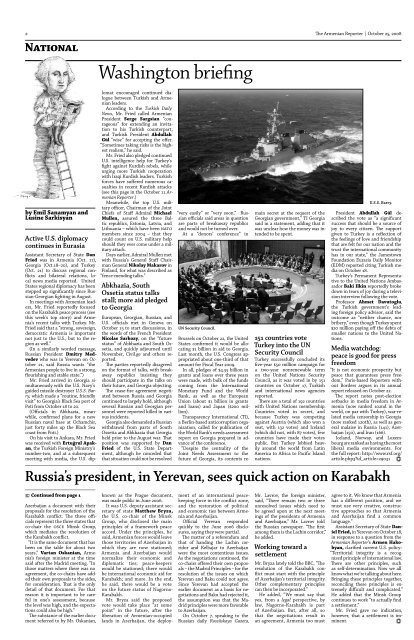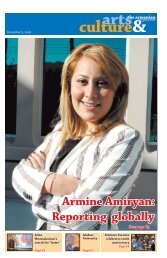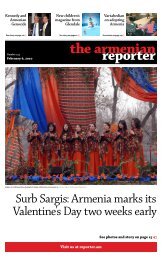National, International, Armenia, and Community News and Opinion
National, International, Armenia, and Community News and Opinion
National, International, Armenia, and Community News and Opinion
You also want an ePaper? Increase the reach of your titles
YUMPU automatically turns print PDFs into web optimized ePapers that Google loves.
The <strong>Armenia</strong>n Reporter | October 25, 2008<strong>National</strong>Washington briefingby Emil Sanamyan <strong>and</strong>Lusine SarkisyanActive U.S. diplomacycontinues in EurasiaAssistant Secretary of State DanFried was in <strong>Armenia</strong> (Oct. 17),Georgia (Oct.18–20), <strong>and</strong> Turkey(Oct. 21) to discuss regional conflicts<strong>and</strong> bilateral relations, localnews media reported. UnitedStates regional diplomacy has beenstepped up significantly since Russian-Georgianfighting in August.In meetings with <strong>Armenia</strong>n leaders,Mr. Fried reportedly focusedon the Karabakh peace process (seethis week’s top story) <strong>and</strong> <strong>Armenia</strong>’srecent talks with Turkey. Mr.Fried said that a “strong, sovereign,democratic <strong>Armenia</strong> is importantnot just to the U.S., but to the regionas well.”(In a similarly worded message,Russian President Dmitry Medvedevwho was in Yerevan on October21, said Russia wants “the<strong>Armenia</strong>n people to live in a strong,flourishing <strong>and</strong> stable state.”)Mr. Fried arrived in Georgia simultaneouslywith the U.S. Navy’sguided missile destroyer U.S.S. Barry,which made a “routine, friendlyvisit” to Georgia’s Black Sea port ofPoti from October 18 to 20.(Officials in Abkhazia, meanwhile,confirmed plans for a newRussian naval base at Ochamchir,just forty miles up the Black Seacoast from Poti.)On his visit to Ankara, Mr. Friedwas received with Ertuğrul Apakan,the Turkish Foreign Ministry’snumber-two, <strong>and</strong> at a subsequentmeeting with media, the U.S. diplomatencouraged continued dialoguebetween Turkish <strong>and</strong> <strong>Armenia</strong>nleaders.According to the Turkish Daily<strong>News</strong>, Mr. Fried called <strong>Armenia</strong>nPresident Serge Sargsian “courageous”for extending an invitationto his Turkish counterpart,<strong>and</strong> Turkish President AbdullahGül “wise” for accepting the offer.“Sometimes taking risks is the highestrealism,” he said.Mr. Fried also pledged continuedU.S. intelligence help for Turkey’sfight against Kurdish rebels, whileurging more Turkish cooperationwith Iraqi Kurdish leaders. Turkishforces have suffered numerous casualtiesin recent Kurdish attacks(see this page in the October 11 <strong>Armenia</strong>nReporter.)Meanwhile, the top U.S. militaryofficer, Chairman of the JointChiefs of Staff Admiral MichaelMullen, assured the three Balticrepublics, Estonia, Latvia, <strong>and</strong>Lithuania – which have been NATOmembers since 2004 – that theycould count on U.S. military helpshould they ever come under a militaryattack.Days earlier, Admiral Mullen metwith Russia’s General Staff ChairmanGeneral Nikolay Makarov inFinl<strong>and</strong>, for what was described as“fence-mending talks.”Abkhazia, SouthOssetia status talksstall; more aid pledgedto GeorgiaEuropean, Georgian, Russian, <strong>and</strong>U.S. officials met in Geneva onOctober 15 to start discussions, inthe words of the French PresidentNicolas Sarkozy, on the “futurestatus” of Abkhazia <strong>and</strong> South Ossetia,<strong>and</strong> quickly adjourned untilNovember, Civil.ge <strong>and</strong> others reported.The parties reportedly disagreedon the format of talks, with breakawayrepublics insisting theyshould participate in the talks ontheir future, <strong>and</strong> Georgia objecting.The cease-fire agreement negotiatedbetween Russia <strong>and</strong> Georgiacontinued to largely hold, althoughseveral Russian <strong>and</strong> Georgian personnelwere reported killed in variousincidents.Georgia also dem<strong>and</strong>ed a Russianwithdrawal from parts of SouthOssetia <strong>and</strong> Abkhazia that Georgiaheld prior to the August war. Thatposition was supported by DanFried of the U.S. State Department,although he conceded thatthat situation could not be resolved“very easily” or “very soon.” Russianofficials said areas in questionare parts of breakaway republics<strong>and</strong> would not be turned over.At a “donors’ conference” inUN Security Council.Brussels on October 22, the UnitedStates confirmed it would be allocating$1 billion in aid to Georgia.Last month, the U.S. Congress appropriatedabout one-third of thatamount for Fiscal Year 2009.In all, pledges of $4.55 billion ingrants <strong>and</strong> loans over three yearswere made, with bulk of the fundscoming from the <strong>International</strong>Monetary Fund <strong>and</strong> the WorldBank, as well as the EuropeanUnion (about $1 billion in grants<strong>and</strong> loans) <strong>and</strong> Japan ($200 million).Transparency <strong>International</strong> (TI),a Berlin-based anticorruption organization,called for publication ofthe World Bank’s needs assessmentreport on Georgia prepared in advanceof the conference.“Despite the centrality of theJoint Needs Assessment to thefuture of Georgia, its contents remainsecret at the request of theGeorgian government,” TI Georgiasaid in a statement, adding that itwas unclear how the money was intendedto be spent.151 countries voteTurkey into the UNSecurity CouncilTurkey successfully concluded itsfive-year $50 million campaign fora two-year nonrenewable termon the United Nations SecurityCouncil, as it was voted in by 151countries on October 17, Turkish<strong>and</strong> international news agenciesreported.There are a total of 192 countrieswith United Nations membership.Countries voted in secret, <strong>and</strong>because Turkey was competingagainst Austria (which also won aseat, with 132 votes) <strong>and</strong> Icel<strong>and</strong>(which did not, with 87 votes), fewcountries have made their votespublic. But Turkey lobbied heavilyaround the world from LatinAmerica to Africa to Pacific Isl<strong>and</strong>nations.U.S.S. Barry.President Abdullah Gül describedthe vote as “a significantsuccess that should be a source ofjoy to every citizen. The supportgiven to Turkey is a reflection ofthe feelings of love <strong>and</strong> friendshipthat are felt for our nation <strong>and</strong> thetrust the international communityhas in our state,” the JamestownFoundation Eurasia Daily Monitor(EDM) reported citing Turkish mediaon October 18.Turkey’s Permanent Representativeto the United Nations AmbassadorBaki Ilkin reportedly brokedown in tears of joy during a televisioninterview following the vote.Professor Ahmet Davutoglu,the Turkish government’s leadingforeign policy advisor, said theoutcome as “neither chance, norbribery,” even though Turkey spent$20 million paying off the debts ofsmaller nations to the United Nations.Media watchdog:peace is good for pressfreedom“It is not economic prosperity butpeace that guarantees press freedom,”Paris-based Reporters withoutBorders argues in its annualreport released on October 22.The report notes post-electionsetbacks in media freedom in <strong>Armenia</strong>(now ranked 102nd in theworld, on par with Turkey), war-relatedmedia censorship in Georgia(now ranked 120th), as well as generalmalaise in Russia (141), Azerbaijan(150), <strong>and</strong> Iran (166).Icel<strong>and</strong>, Norway, <strong>and</strong> Luxembourgare ranked as having the mostliberal media environments. Forthe full report: http://www.rsf.org/article.php3?id_article=29031 fRussia’s president, in Yerevan, sees quick action on Karabakhn Continued from page Azerbaijan a document with theirproposals for the resolution of theKarabakh conflict. The three officialsrepresent the three states thatco-chair the OSCE Minsk Group,which mediates the resolution ofthe Karabakh conflict.“It is the same document that hasbeen on the table for about twoyears,” Vartan Oskanian, <strong>Armenia</strong>’sforeign minister at the timesaid after the Madrid meeting. “Inthose matters where there was noagreement, the co-chairs have addedtheir own proposals to the sides,for consideration. That is the onlydetail of that document. For thatreason it is important to be carefulin one’s assessment, becausethe level was high, <strong>and</strong> the expectationscould also be high.”The substance of the earlier documentreferred to by Mr. Oskanian,known as the Prague document,was made public in June 2006.It was U.S. deputy assistant secretaryof state Matthew Bryza,the U.S. co-chair of the MinskGroup, who disclosed the mainprinciples of a framework peaceaccord. Under the principles, hesaid, <strong>Armenia</strong>n forces would leavethose territories of Azerbaijan inwhich they are now stationed;<strong>Armenia</strong> <strong>and</strong> Azerbaijan wouldnormalize their economic <strong>and</strong>diplomatic ties; peace-keeperswould be stationed; there wouldbe international economic aid forKarabakh; <strong>and</strong> more. In the end,he said, there would be a voteon the future status of Nagorno-Karabakh.Mr. Bryza said the proposedvote would take place “at somepoint” in the future, after theliberation of <strong>Armenia</strong>n-occupiedl<strong>and</strong>s in Azerbaijan, the deploymentof an international peacekeepingforce in the conflict zone,<strong>and</strong> the restoration of political<strong>and</strong> economic ties between <strong>Armenia</strong><strong>and</strong> Azerbaijan.Official Yerevan respondedquickly to the June 2006 disclosures,saying they were partial.The matter of a referendum <strong>and</strong>that of h<strong>and</strong>ing the Lachin corridor<strong>and</strong> Kelbajar to Azerbaijanwere the most contentious issues.As the negotiations continued, theco-chairs offered their own proposals– the Madrid Principles – for theresolution of the issues on whichYerevan <strong>and</strong> Baku could not agree.Since Yerevan had accepted theearlier document as a basis for negotiations<strong>and</strong> Baku had rejected it,the assumption was that the Madridprinciples were more favorableto Azerbaijan.On October 7, speaking to theRussian daily Rossiiskaya Gazeta,Mr. Lavrov, the foreign minister,said, “There remain two or threeunresolved issues which need tobe agreed upon at the next meetingsof the presidents of <strong>Armenia</strong><strong>and</strong> Azerbaijan,” Mr. Lavrov toldthe Russian newspaper. “The firstamong them is the Lachin corridor,”he added.Working toward asettlementMr. Bryza lately told the BBC, “Theresolution of the Karabakh conflictmust start with the principleof Azerbaijan’s territorial integrity.Other complementary principlescan then be incorporated.”He added, “We must say thatyes, from a legal perspective, bylaw, Nagorno-Karabakh is partof Azerbaijan. But, after all, sothat the negotiations result inan agreement, <strong>Armenia</strong> too mustagree to it. We know that <strong>Armenia</strong>has a different position, <strong>and</strong> wemust use very creative, constructiveapproaches so that <strong>Armenia</strong><strong>and</strong> Azerbaijan find a commonlanguage.”Assistant Secretary of State DanielFried, in Yerevan on October 18,in response to a question from the<strong>Armenia</strong>n Reporter’s Armen Hakobyan,clarified current U.S. policy:“Territorial integrity is a recognizedprinciple of international law.There are other principles, suchas self-determination. Now we allknow what we’re talking about here.Bringing these principles together,reconciling these principles is extremelydifficult <strong>and</strong> complicated.”He added that the Minsk Groupcontinues to work “to actually finda settlement.”Mr. Fried gave no indication,however, that a settlement is imminent.f
















